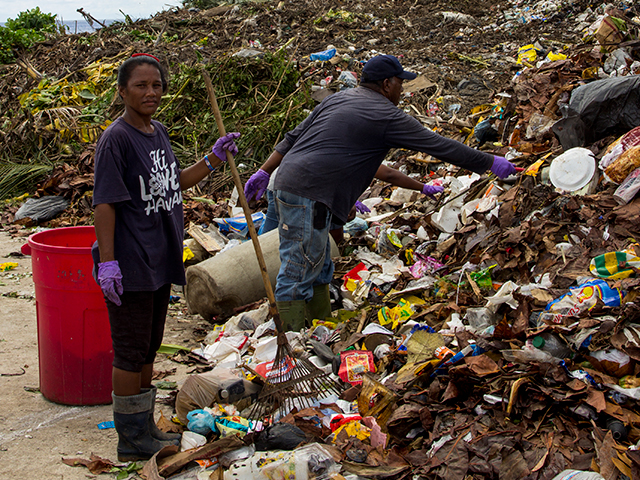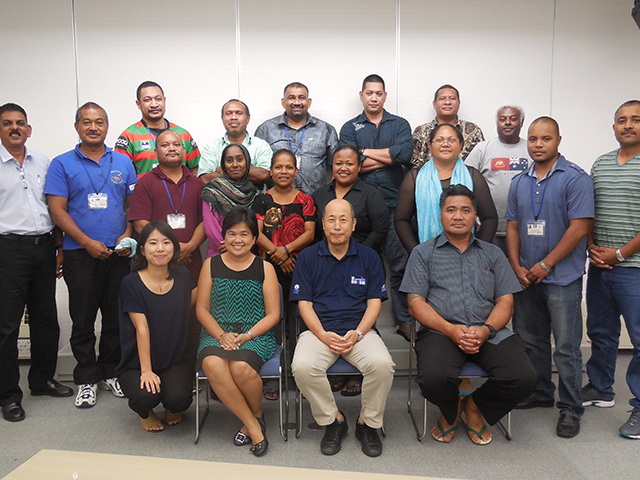
Waste Management and Pollution Control
The important contribution made by local counterparts to the improved management of solid waste in the Pacific region has been emphasised at a regional gathering in Okinawa, Japan.
The 'Training of Trainers for the Promotion of Local Experts' meeting, held from 25 May - 4 June, brought together representatives involved in the Project for Promotion of Regional Initiative Solid Waste Management, known as J-PRISM.

A key focus of the J-PRISM project, which will wrap up in January 2016 after more than five successful years, has been to strengthen the human and institutional capacity base for sustainable solid waste management in the Pacific region.
The success of this capacity building was evident at the Okinawa meeting, where representatives from Fiji, Federated States of Micronesia, Tonga, Palau, Papua New Guinea and Vanuatu shared their experiences in implementing solid waste management initiatives in their respective countries.
The dedication and commitment on show was commended by the Japan International Cooperation Agency (JICA) who provide funding support for J-PRISM.

This praise was echoed by Mr Shiro Amano, J-PRISM Chief Adviser, who announced that these successes would be documented and promoted around the region through the development of an updated Pacific Solid Waste Management Guidebook:
"The production of a regional waste management guidebook written by the experts themselves, and based on practical experiences will enable full ownership of the document and its content. J-PRISM is also hoping that the guidebook will invite interests from other countries to embark on the same remarkable accomplishments of these participants and participating countries."
Dr David Haynes, Director of Waste Management and Pollution Control at the Secretariat of the Pacific Regional Environment Programme (SPREP), explains the importance of capturing and sharing vital knowledge:
"Over the past decade, the Pacific region has seen a huge growth in awareness of the negative impact that poor waste management can have on island ecosystems and human health. The careful documentation of success stories and lessons learned from pioneering projects like J-PRISM will contribute to the success of future interventions."
The new guidebook, scheduled for release in December 2015, will be facilitated by J-PRISM with assistance from SPREP and technical guidance from Professor Kunitoshi Sakurai of Okinawa University.
For more information, please contact Ma Bella Guinto at [email protected]
The 'Training of Trainers for the Promotion of Local Experts' meeting, held from 25 May - 4 June, brought together representatives involved in the Project for Promotion of Regional Initiative Solid Waste Management, known as J-PRISM.

The Pacific region has seen a huge growth in awareness of the negative impact that poor waste management can have on island ecosystems and human health. Photo: D.Haynes/SPREP
A key focus of the J-PRISM project, which will wrap up in January 2016 after more than five successful years, has been to strengthen the human and institutional capacity base for sustainable solid waste management in the Pacific region.
The success of this capacity building was evident at the Okinawa meeting, where representatives from Fiji, Federated States of Micronesia, Tonga, Palau, Papua New Guinea and Vanuatu shared their experiences in implementing solid waste management initiatives in their respective countries.
The dedication and commitment on show was commended by the Japan International Cooperation Agency (JICA) who provide funding support for J-PRISM.

Participants at the 'Training of Trainers for the Promotion of Local Experts' meeting in Okinawa, Japan.
This praise was echoed by Mr Shiro Amano, J-PRISM Chief Adviser, who announced that these successes would be documented and promoted around the region through the development of an updated Pacific Solid Waste Management Guidebook:
"The production of a regional waste management guidebook written by the experts themselves, and based on practical experiences will enable full ownership of the document and its content. J-PRISM is also hoping that the guidebook will invite interests from other countries to embark on the same remarkable accomplishments of these participants and participating countries."
Dr David Haynes, Director of Waste Management and Pollution Control at the Secretariat of the Pacific Regional Environment Programme (SPREP), explains the importance of capturing and sharing vital knowledge:
"Over the past decade, the Pacific region has seen a huge growth in awareness of the negative impact that poor waste management can have on island ecosystems and human health. The careful documentation of success stories and lessons learned from pioneering projects like J-PRISM will contribute to the success of future interventions."
The new guidebook, scheduled for release in December 2015, will be facilitated by J-PRISM with assistance from SPREP and technical guidance from Professor Kunitoshi Sakurai of Okinawa University.
For more information, please contact Ma Bella Guinto at [email protected]